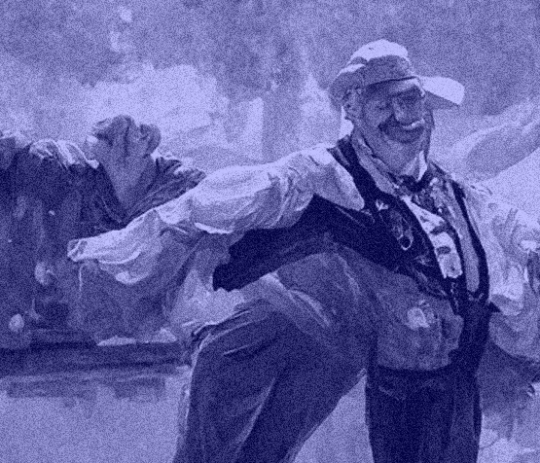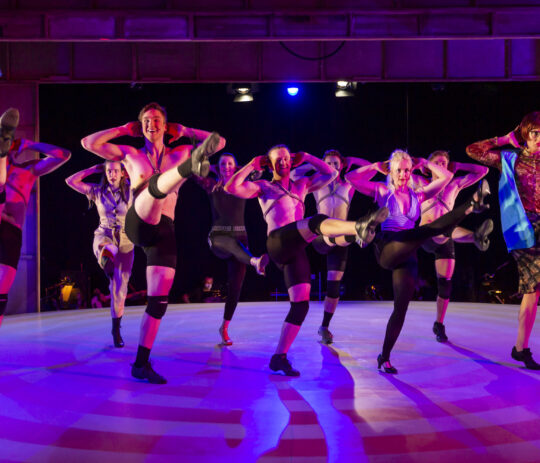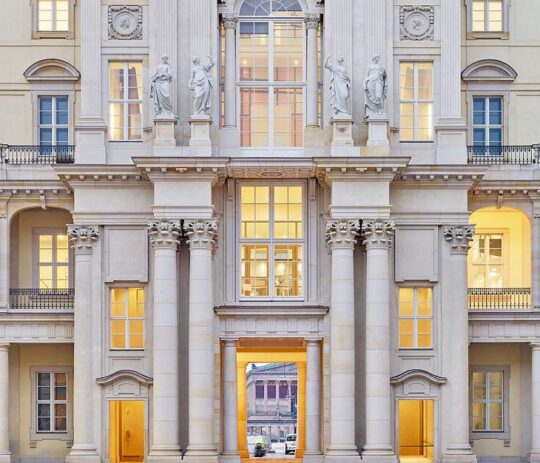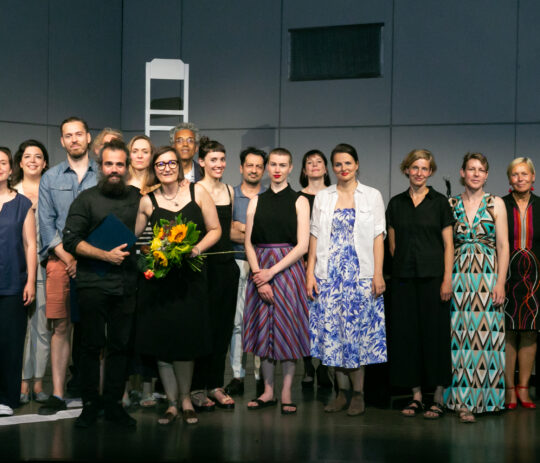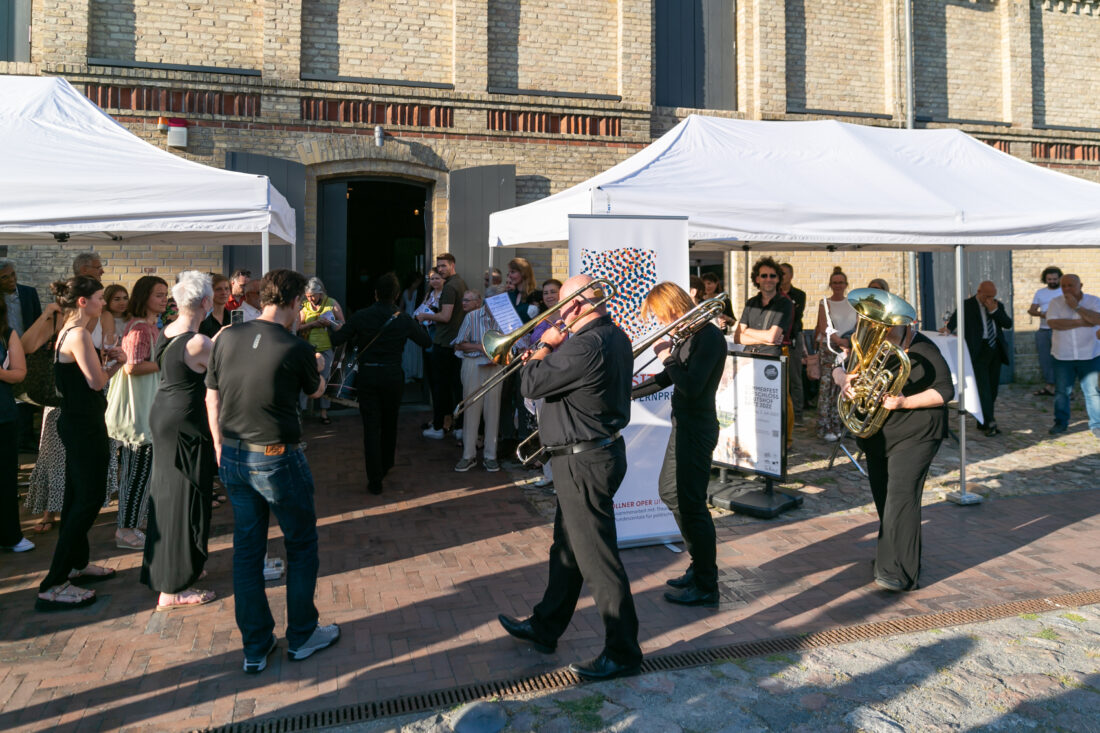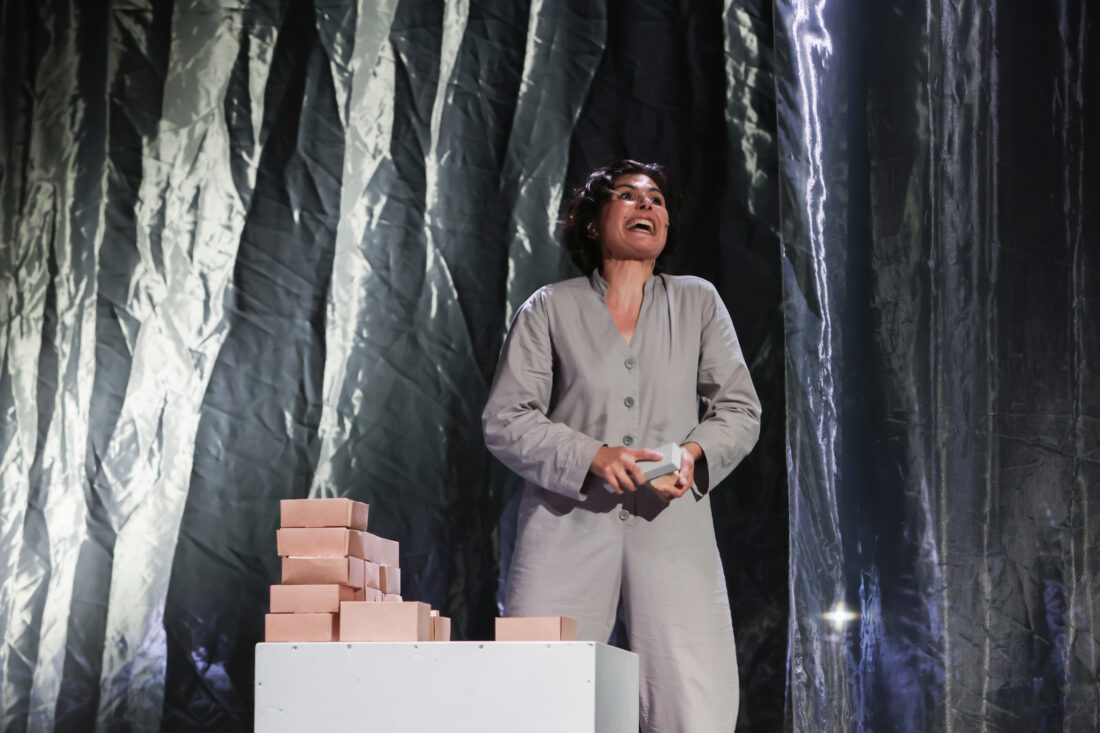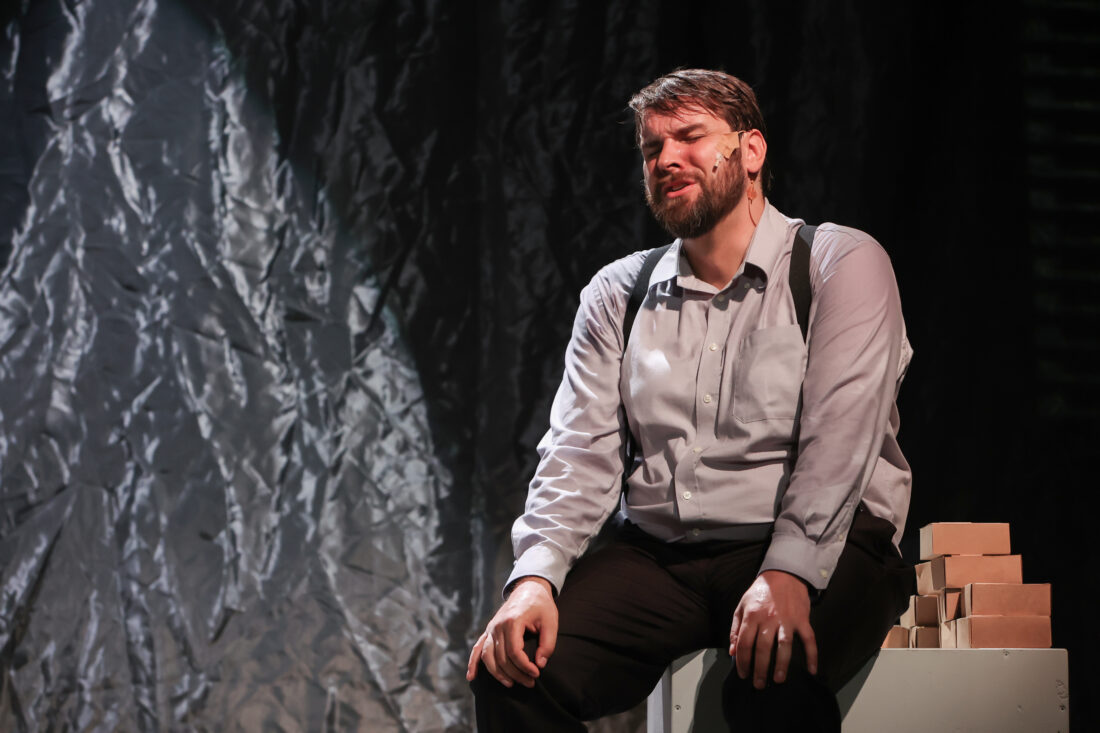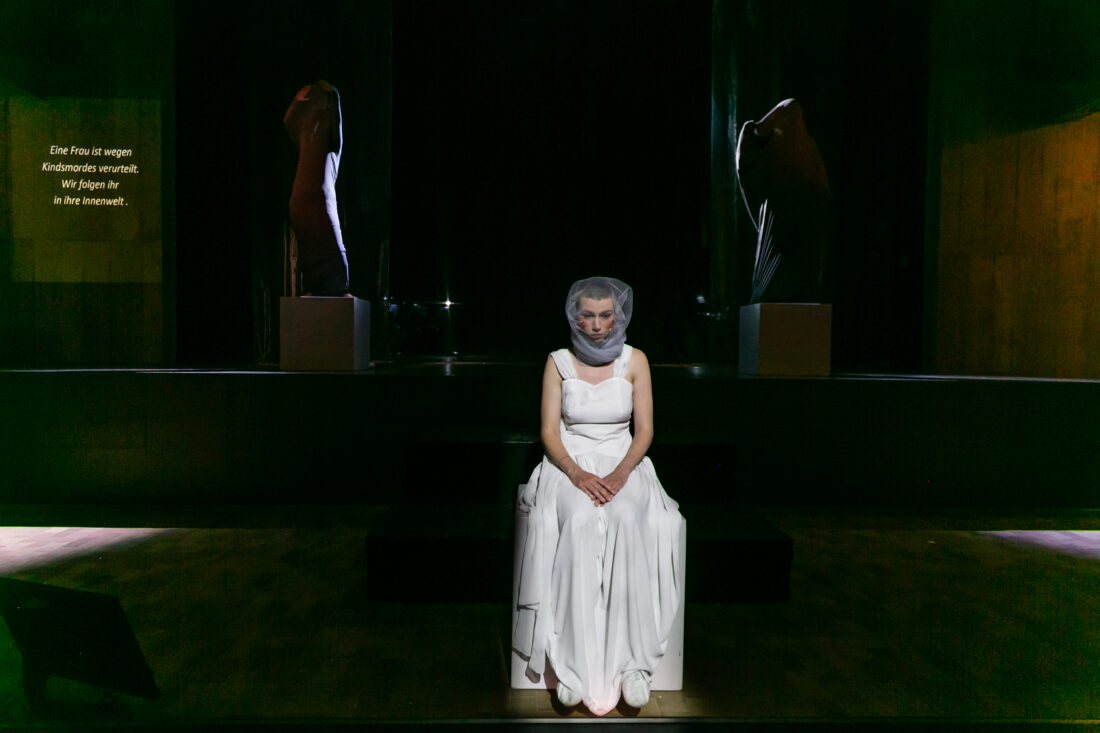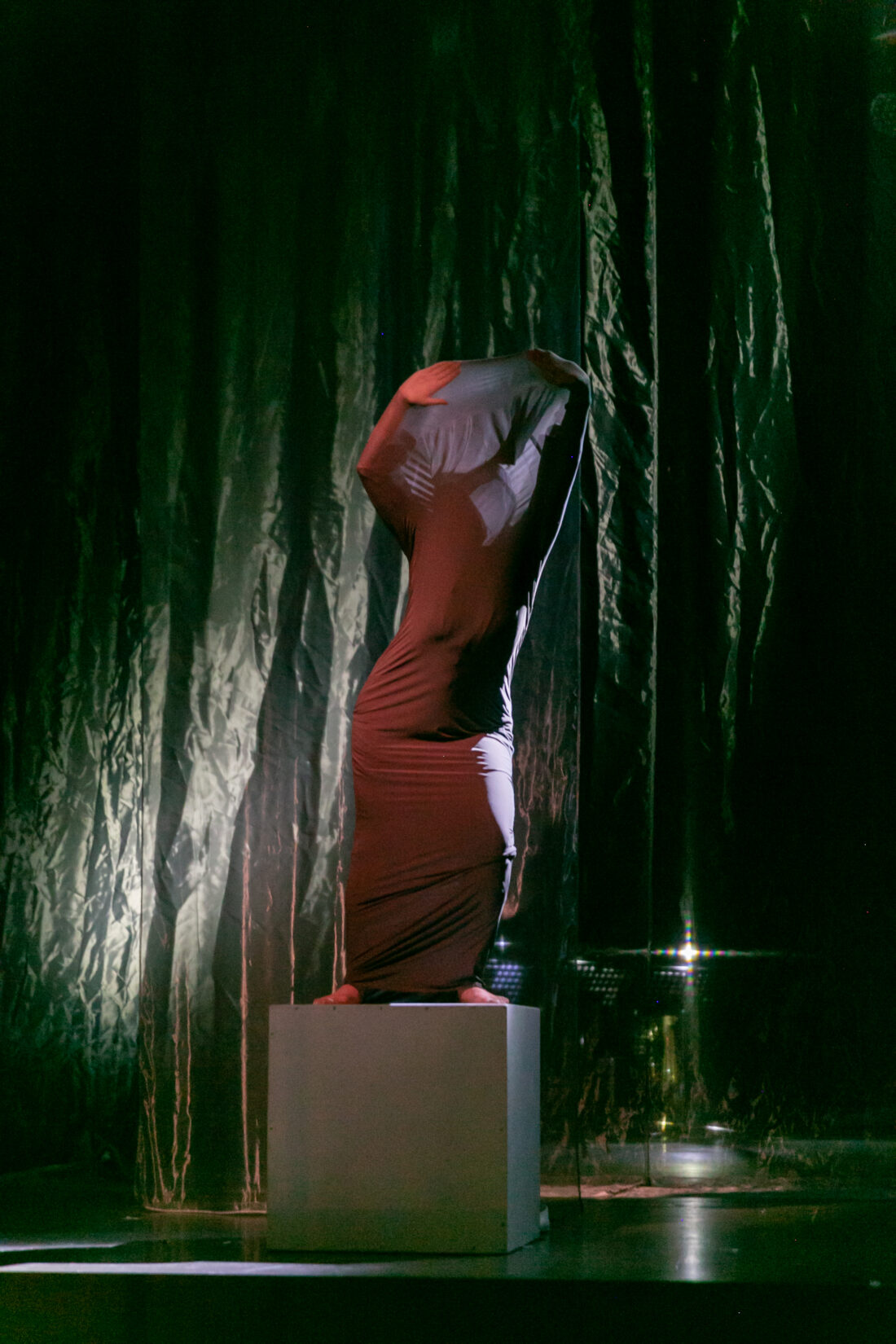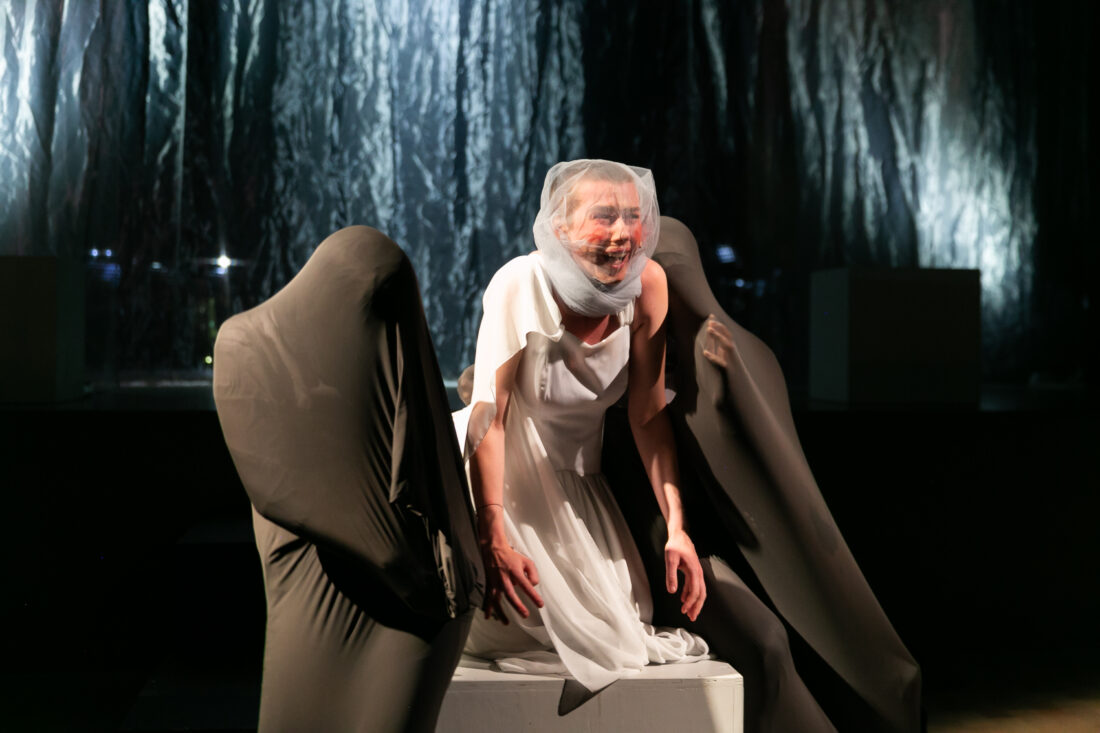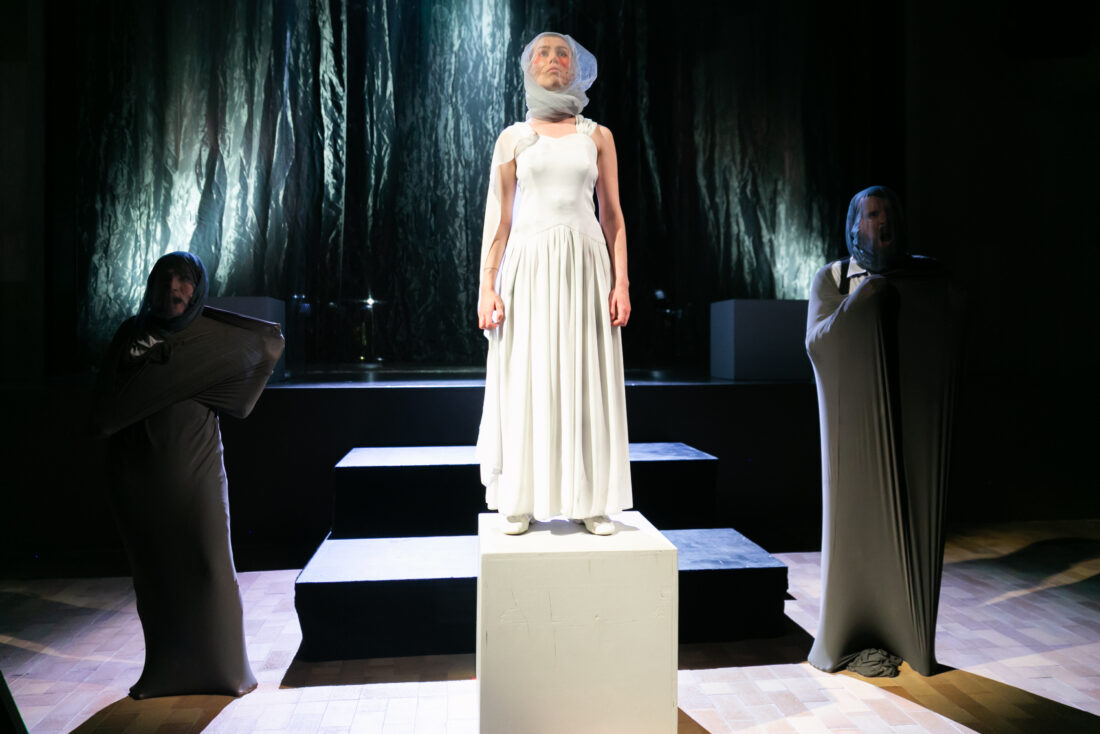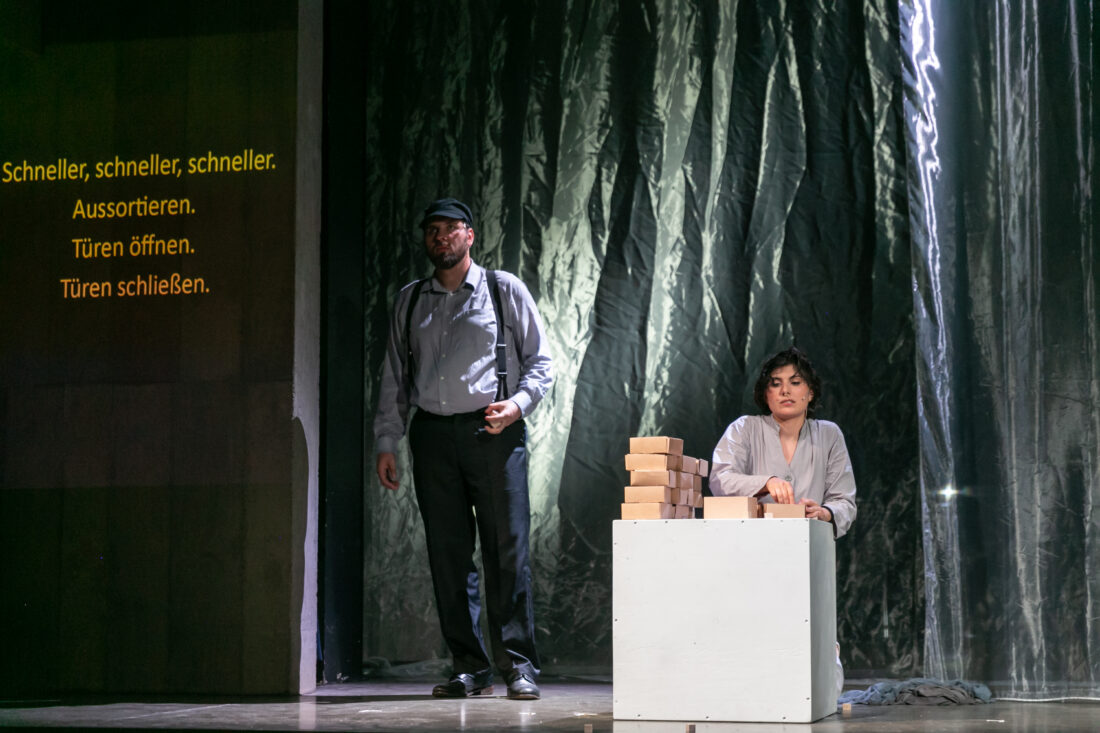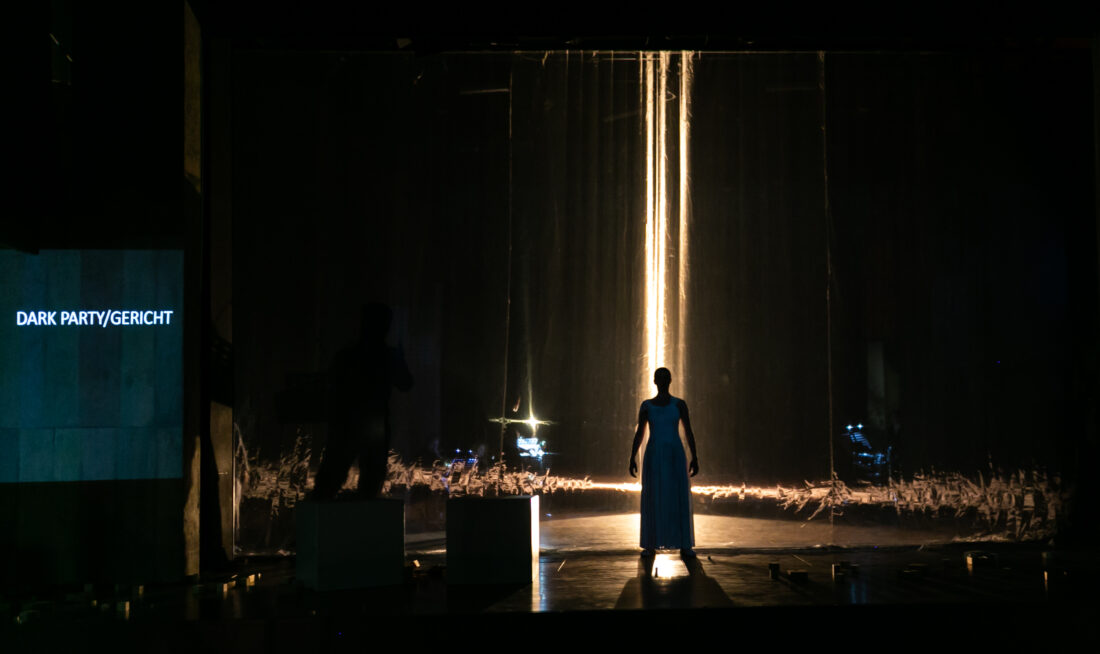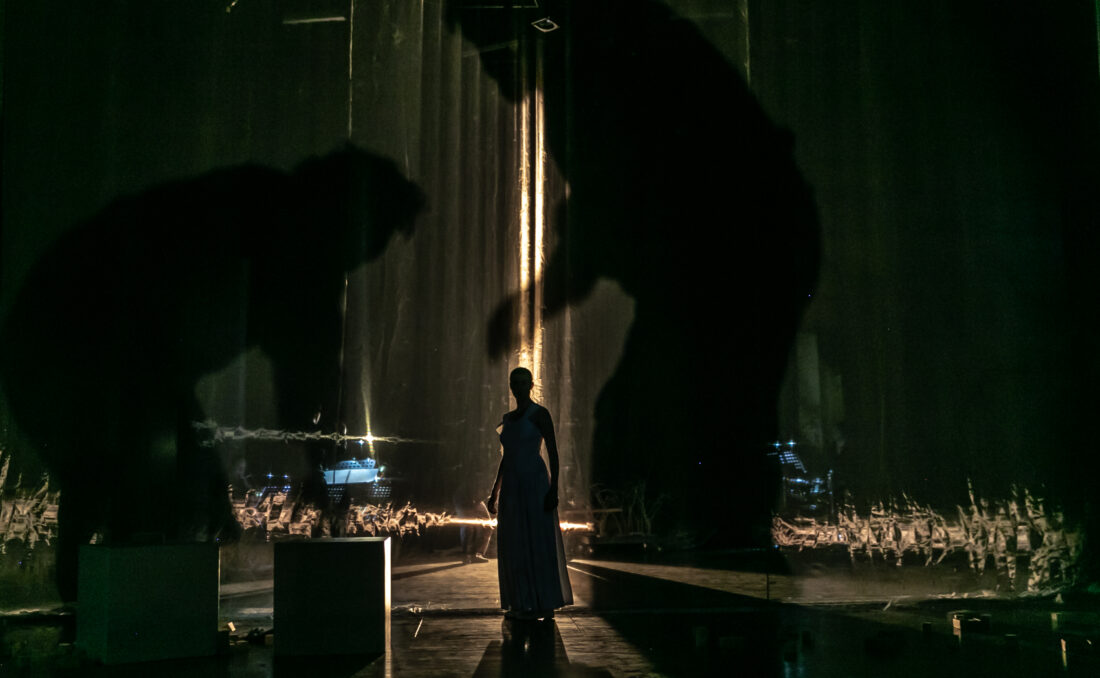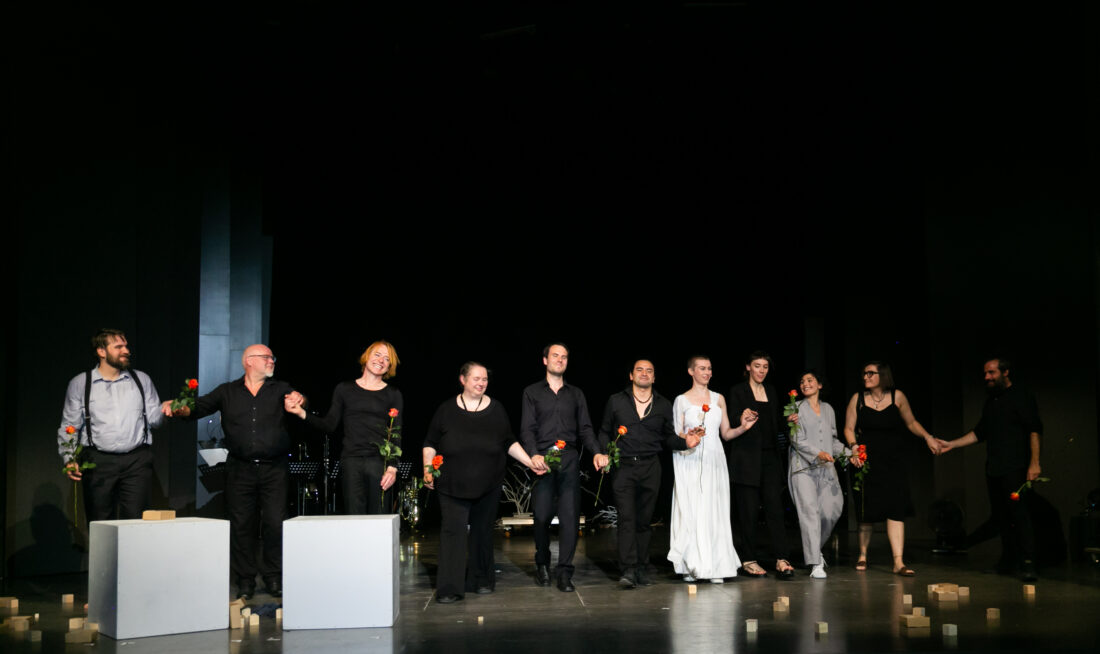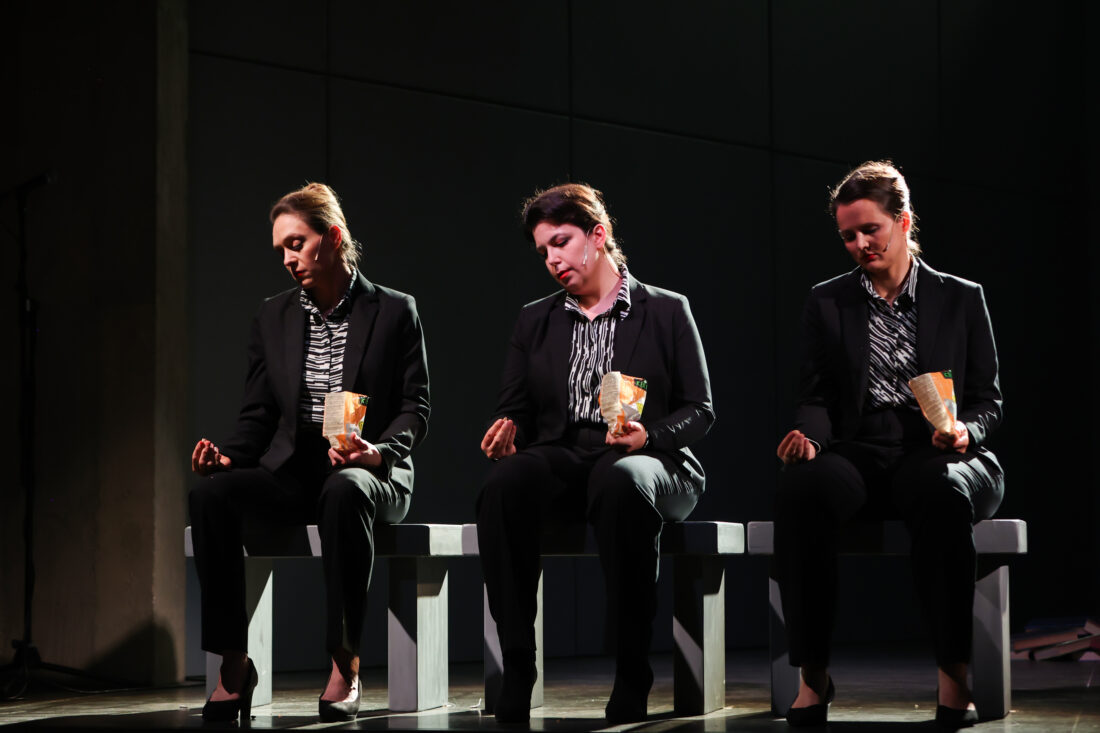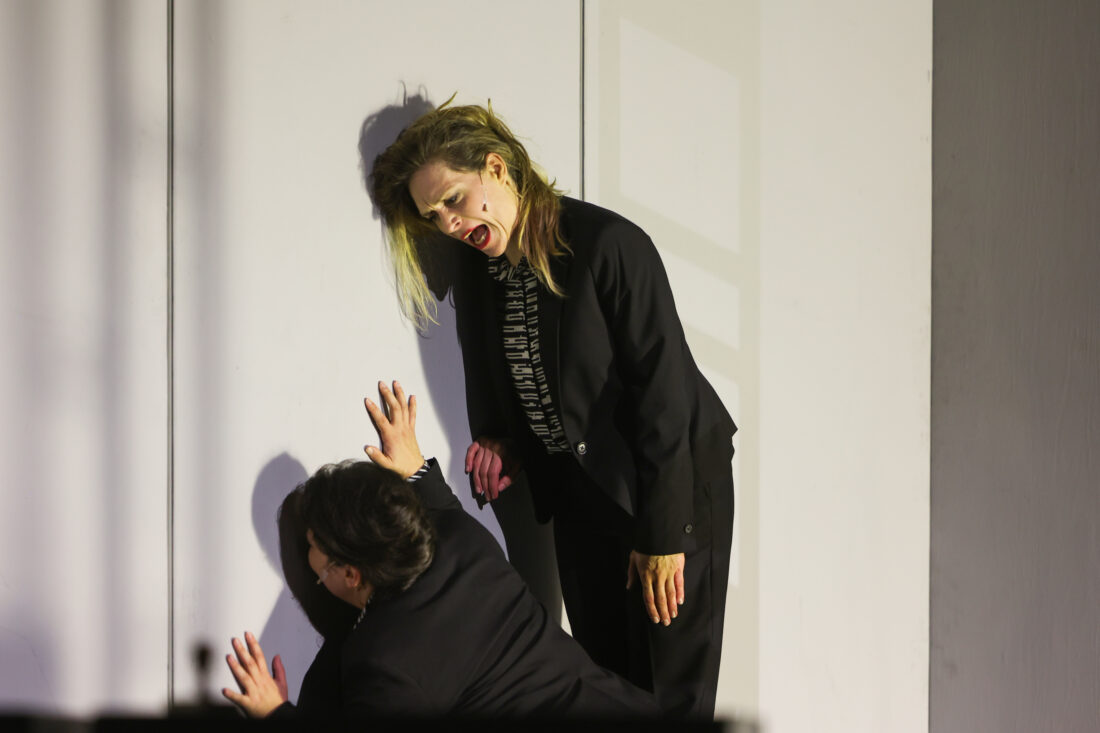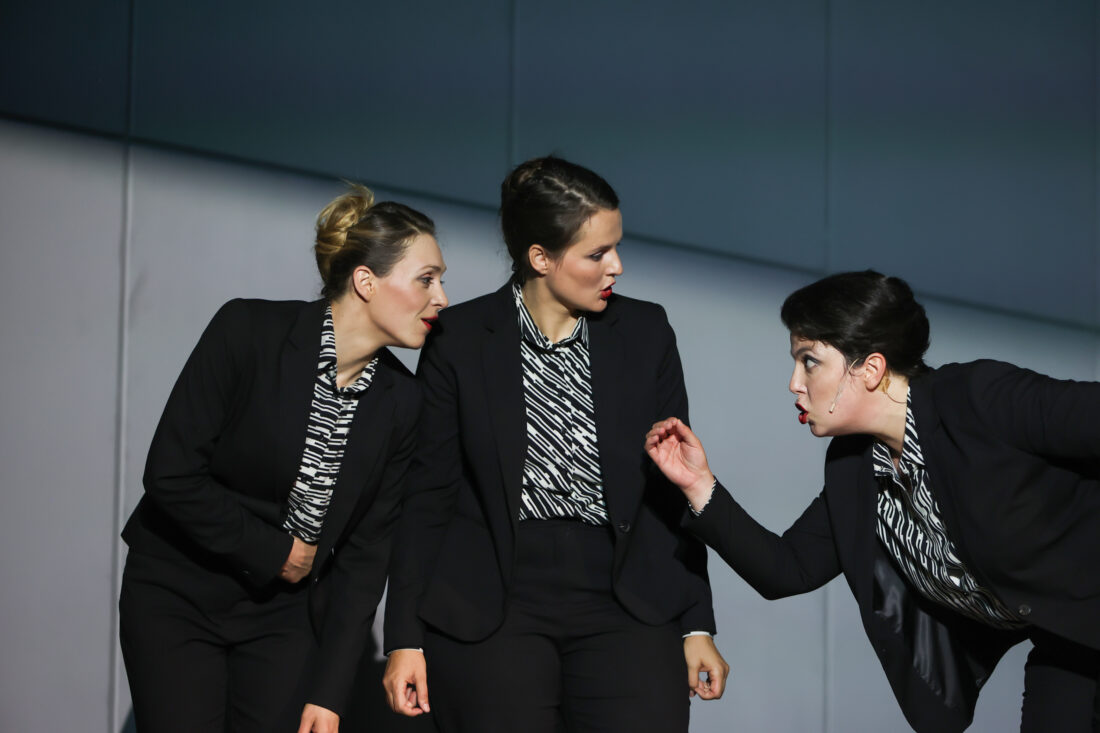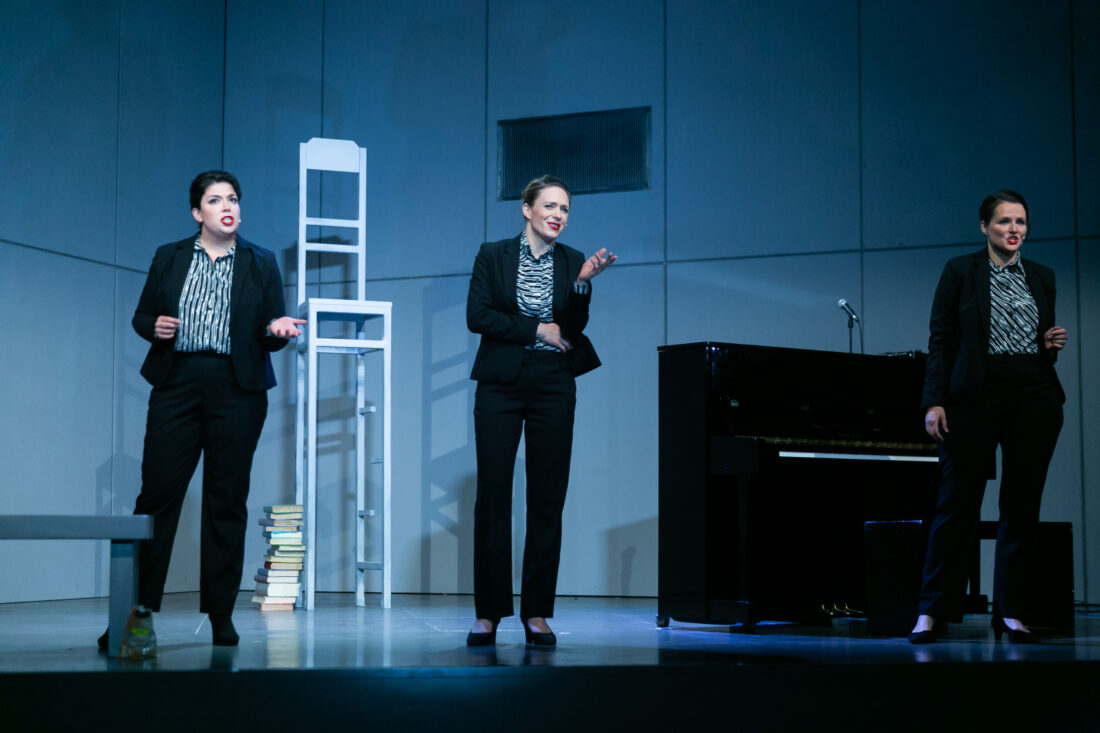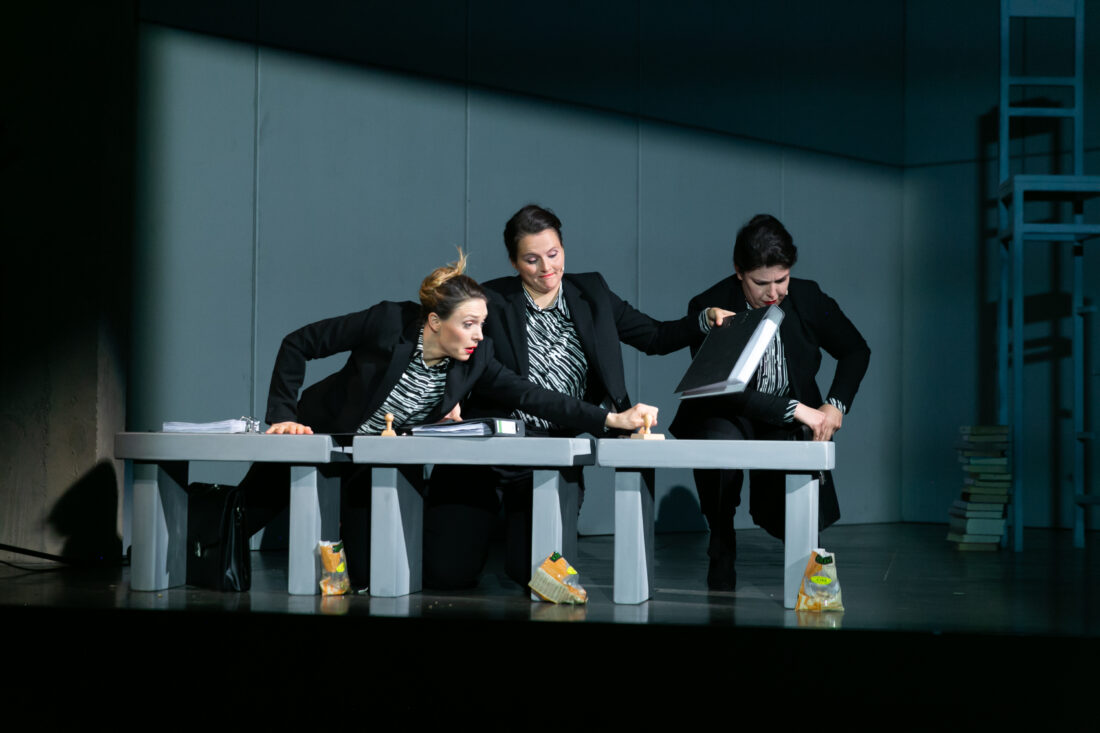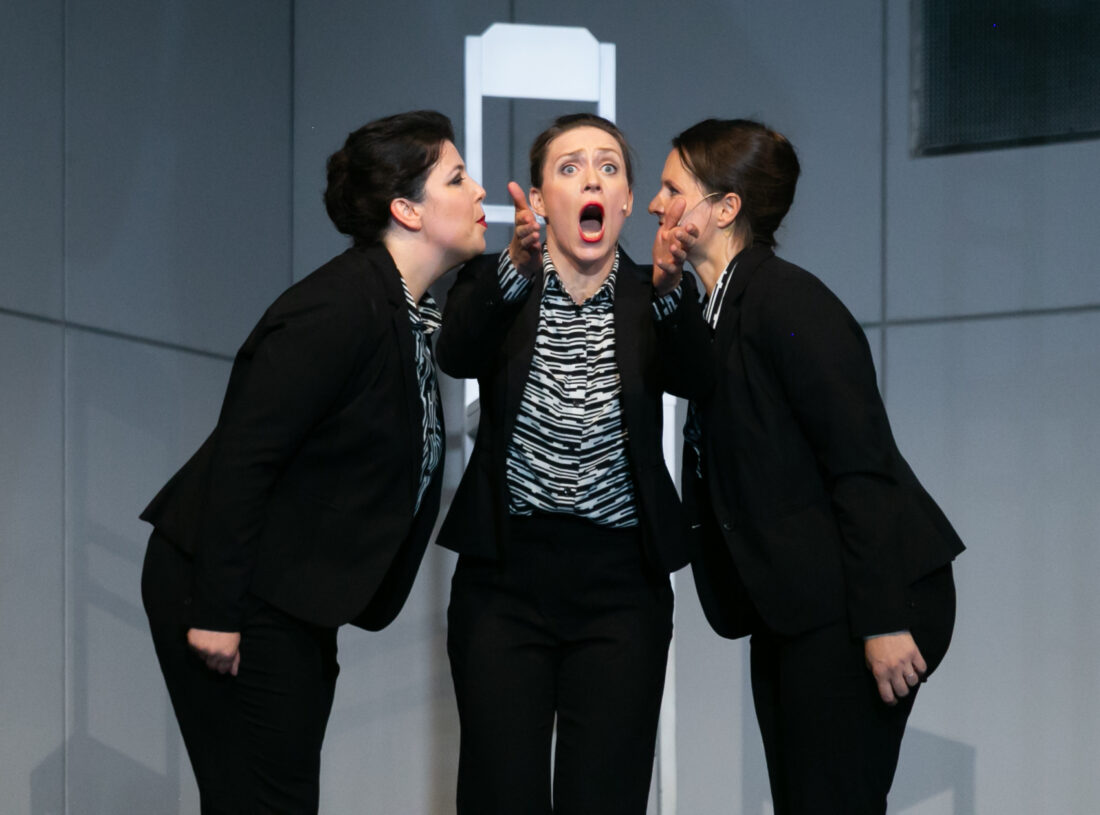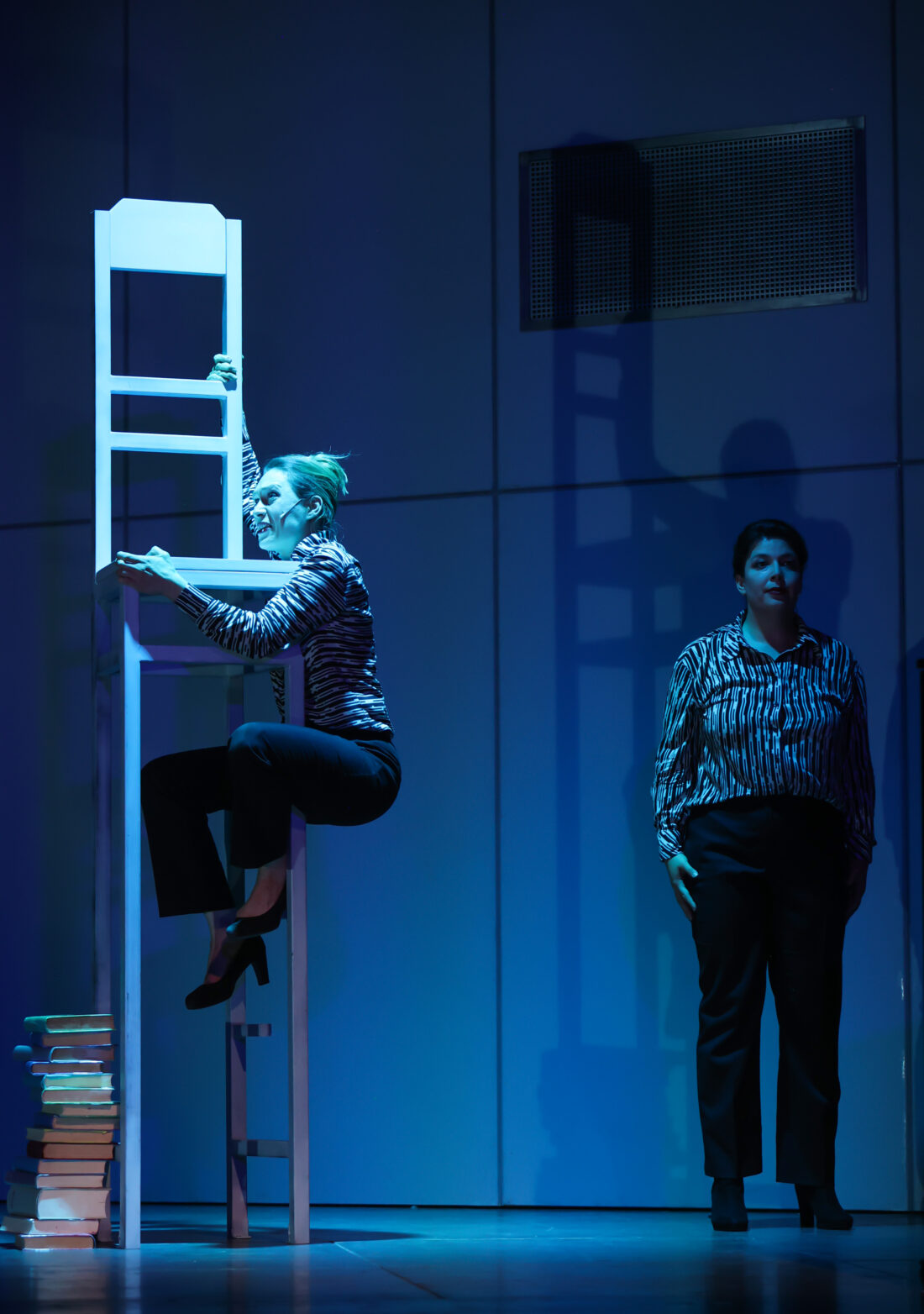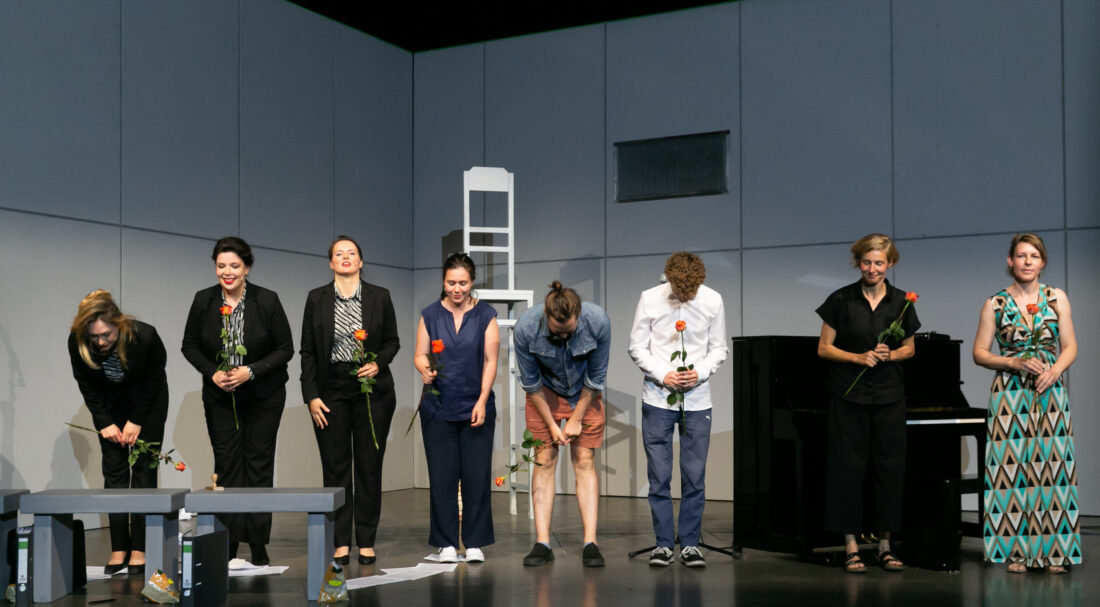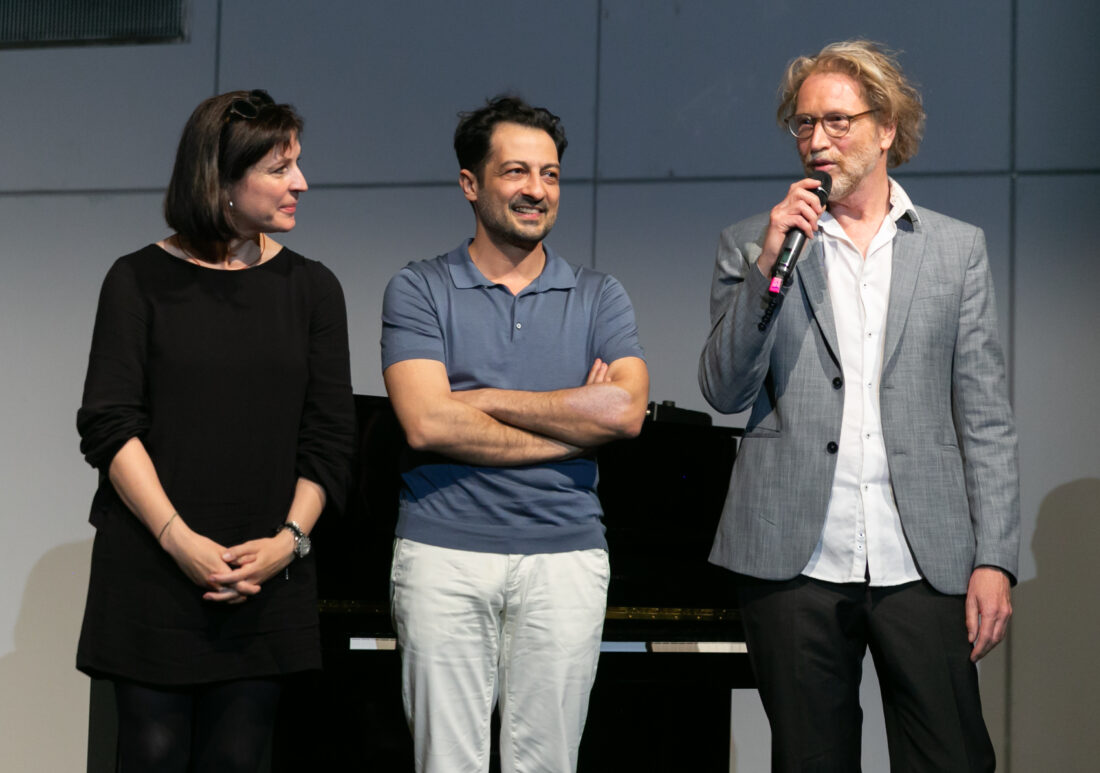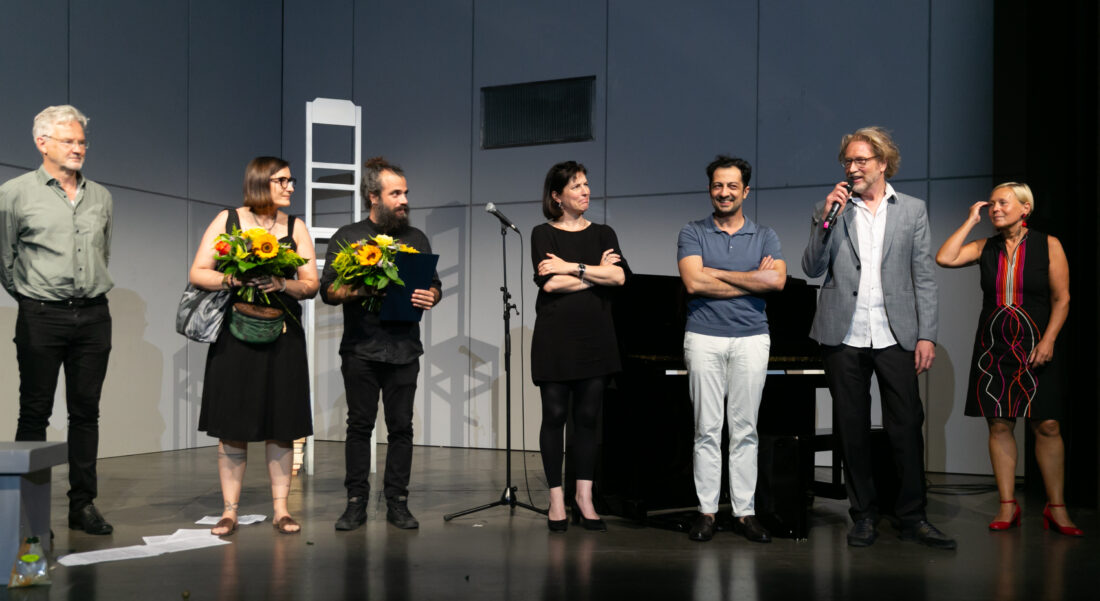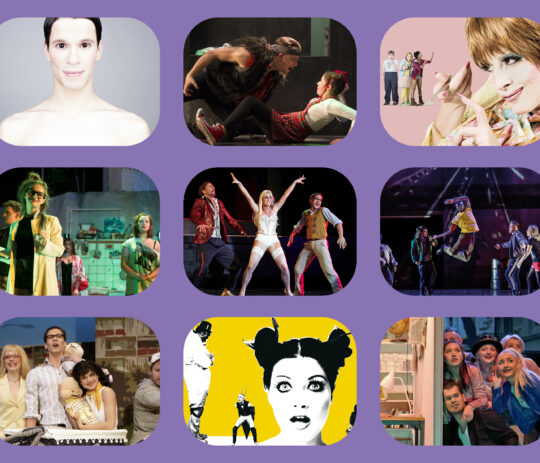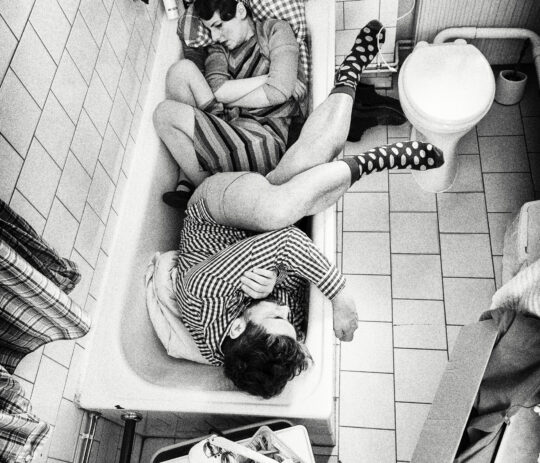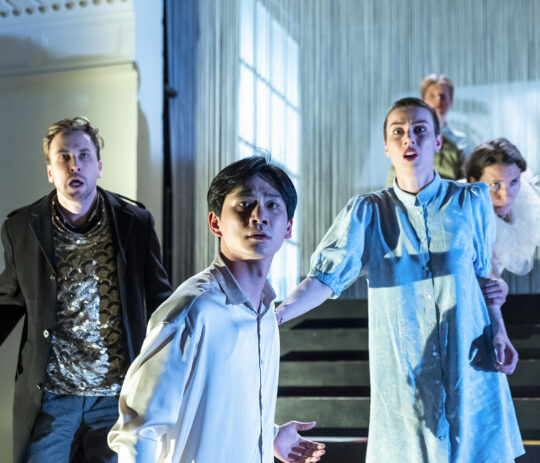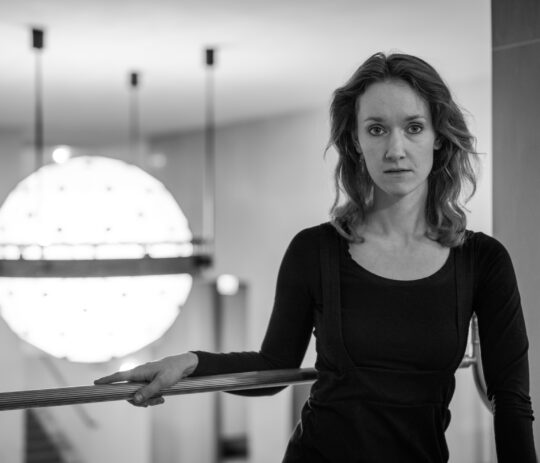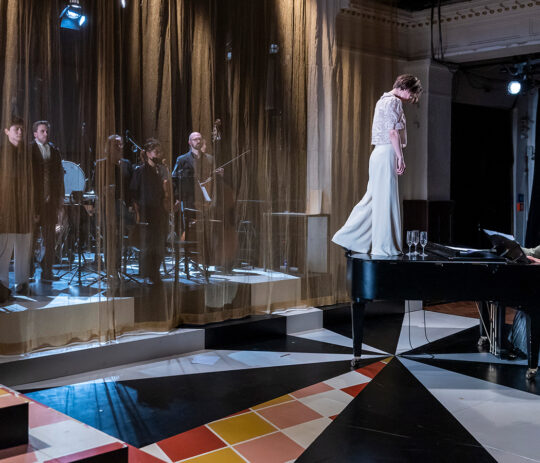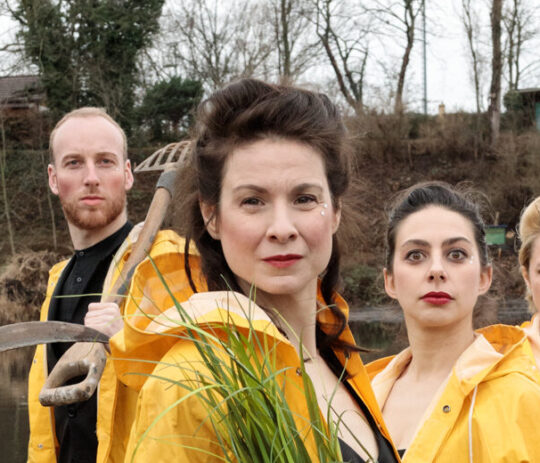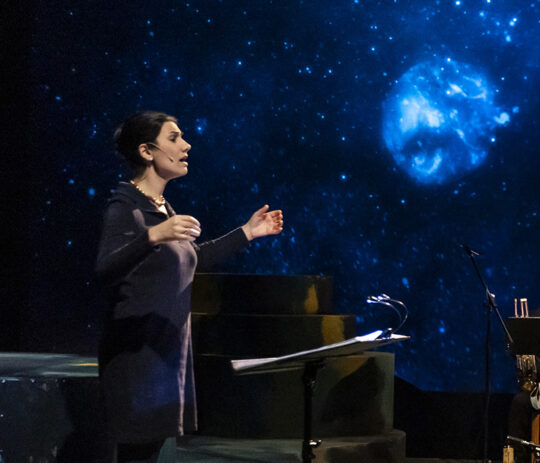The mountains, an oil rig, the desert….three places in our plays that stand for a desire to explore the world and for a world of change, and thus for the themes and artist* teams in the 22/23 season.
Continue reading "Season 2022/23"Category: Allgemein
The Volkslied 3000-Jury Made it’s decision…
… about the winners of the composition competition, who can be heard live at the Kommen und Gehen Festival in Görlitz on August 21 and at VOLKSLIED 3000. Das Konzert on September 3, alongside commissioned compositions by Max Prosa & Alin Coen, Die Grenzgänger, João Oreccia and Tonia Reeh.
We congratulate the following prize winners for the musical settings of the texts generated by the artificial intelligence GPT3 (in no particular order)
Johannes Wester: “Stars
Anton Israel: “Time to flee”.
Pony Pracht: “And I know”.
Migati: “Generate little text, please”.
Rosenroth: “Time of silence”
as well as the special prize winner
Anne Munka: “Nazis out!”
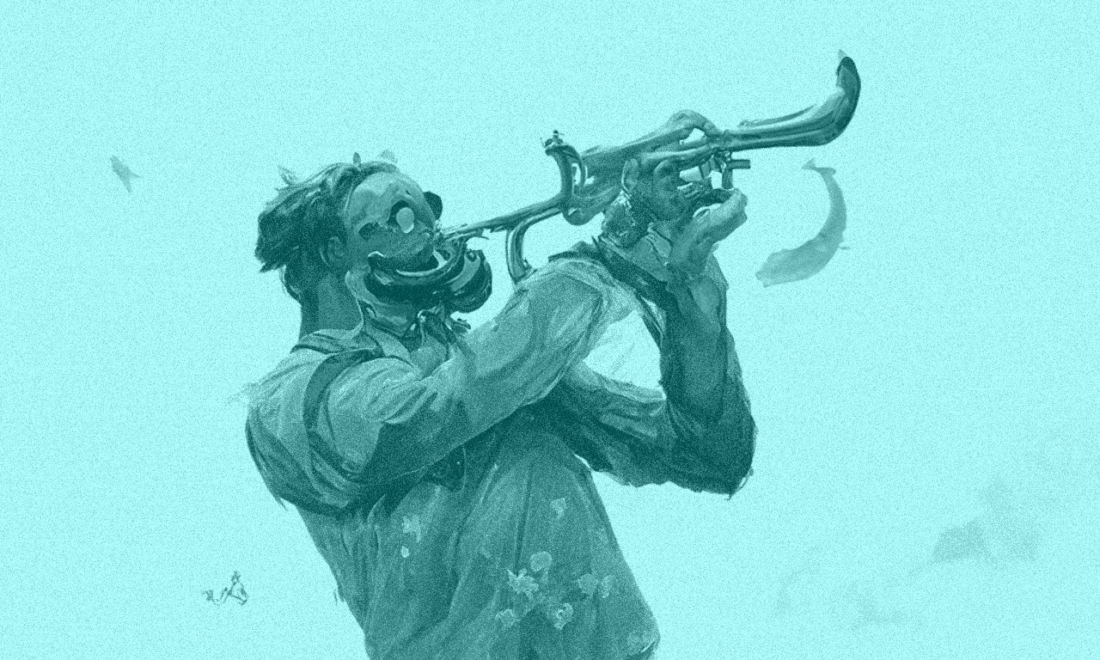
VOLKSLIED 3000 – Das Konzert
3 September 2022, 8 pm
Presentation of winning songs and the commissioned works by Max Prosa & Alin Coen, Die Grenzgänger, João Oreccia und Tonia Reeh at Neuköllner Oper
Back on stage
From tonight on there will finally be dancing around the golden calf again at PARADISE LOST – THE GENESIS OF MUSICAL in front of a sold-out hall, thanks to the spontaneous stepping in of Fabian Grimmeisen and the further commitment of Nathan Johns!
Photo: Thomas Koy
Continue reading "Back on stage"Encounter and Aura
Hartmut Dorgerloh, der Generalintendant des Humbolt-Forums, über unsere gemeinsame Produktion Mexico Aura: The Myth of Possession…
Continue reading "Encounter and Aura"Berliner Opernpreis ComPOSITION: Works premiered and awarded
The winners of the BERLINER OPERNPREIS comPOSITION, the competition organized by Neuköllner Oper and GASAG since 1997, have been announced:
The jury decided to award first prize to the team of Cypriot composer Andys Skordis and Serbian-born librettist Jelena Vuksanovic, and second prize to the team of Australian composer Samuel Penderbayne and German director Theresa von Halle.
The winning works were premiered yesterday in the Kulturstall of Schloss Britz and subsequently evaluated by the jury.
The productions can be seen again on June 24 and 25 at Kulturstall Britz.
The two award-winning works stage the short stories by Ferdinand von Schirach in a moving way. Ein hellblauer Tag/ A Light Blue Day takes us into the inner worlds of a wrongly convicted child murderer and to the origins of Greek theater from cult and intoxication. Subotnik combines current play styles in a virtuoso way and draws a moving portrait of the failure of the young female criminal defense attorney who wants to live up to all expectations
Bernhard Glocksin, Artistic Director of Neuköllner Oper and one of five jury members
The future lies in the next generation. Nothing could be more obvious than offering young talent a stage to try out new things. And with the Neuköllner Oper, we have had the perfect partner for this for 25 years, because it is experienced and established. So this year we are celebrating our silver wedding anniversary, another good reason to support the Neukölln Opera in providing space for talent and innovation.
Georg Friedrichs, Chairman of the Management Board of GASAG on the longstanding cooperation between Neuköllner Oper and the company.
With the BERLINER OPERNPREIS 2020/22, Neuköllner Oper and GASAG challenged young composers* to move out of the art bubble of a so-called “new music” and towards an exchange with society and its different musical languages.
The importance of such socially relevant music theater is underlined by the first-time support of the Federal Agency for Civic Education and the Theater Freiburg, which will offer the first-prize winning team further collaboration.
Alle Fotos: © Thomas Koy
25 years…
Paradise Lost’s director & author Peter Lund on the anniversary of our cooperation with the musical/show course at the UdK Berlin
Continue reading "25 years..."25. Mai NEUER PREMIERENTERMIN FÜR SCHÖNER WOHNEN!
Currently, another ensemble member is ill, therefore both the premiere and the performances on May 21, 22 and 24 are cancelled, new date for the premiere is May 25, 2022. Already purchased tickets can be returned at our box office for a refund or a voucher, for this you can simply write an email to tickets@neukoellneroper.de. Unfortunately, a direct exchange is not possible for organizational reasons. If you have purchased a ticket for one of the cancelled performances and would like to see another performance of Amy Stebbins and Sir Henry’s Sink Play: There are still tickets available for all performance dates of SCHÖNER WOHNEN!
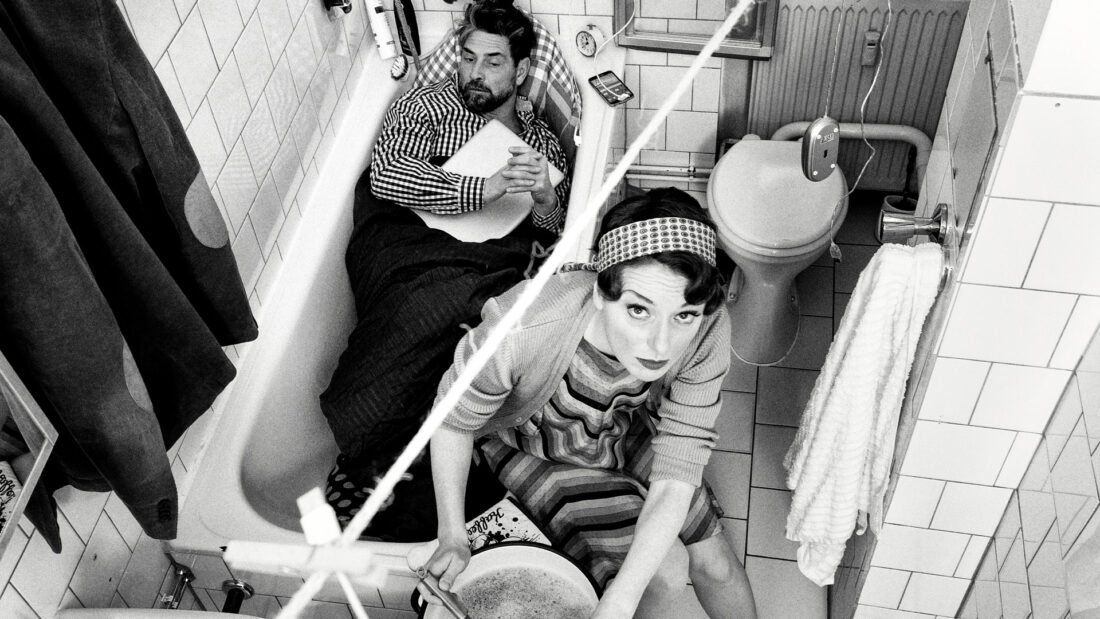
SCHÖNER WOHNEN
Ein Abstellkammerspiel by Amy Stebbins (text, direction) and Sir Henry (music)
Photo: © Thomas Koy
Continue reading "25. Mai NEUER PREMIERENTERMIN FÜR SCHÖNER WOHNEN!"Performance of LILI on 5 May Cancelled
Due to another illness in the ensemble, tomorrow’s performance (5.5.) of LILI. DIE LETZTE NACHT DER LILI BOULANGER unfortunately has to be cancelled, tickets can be returned for a voucher/refund at our box office (tickets@neukoellneroper.de).
The good news is that soprano Amanda Becker is filling in Friday, Saturday and Sunday for Merlind C. Pohl for the musical part of Hélène/Miki Piré, scenically Judith Shoemaker takes over!
Continue reading "Performance of LILI on 5 May Cancelled"The “Essential” isn’t always the “urgent”
Why inspiration for new pieces is sometimes a rather “startled inhale” and which she considers the most pressing issues of our time SCHÖNER WOHNEN text writer and director Amy Stebbins reveals in this interview:
How did SCHÖNER WOHNEN come about? Was there first the text, which was then set to music? Or did you develop the text together with the composer?
A.S.: Well, the “piece” is not finished until after the premiere, because it is of course much more than the sum of text and music. Now we have five weeks of musical and scenic rehearsals ahead of us. This work, the collaboration with the actors, is just as essential for the creation of SCHÖNER WOHNEN as the work at the desk beforehand. Originally, before the pandemic, there were actually three phases planned: First a joint improvisation phase, two weeks with a full cast to try out situations, dialogues, language and music, then an intensive writing phase in which John (Sir Henry, the composer, editor’s note) and I wanted to withdraw, and then four weeks of final rehearsals. Now the virus has really shaken us up, and so we agreed that I would bring a kind of prototypical libretto, a protoscript, a dramaturgical framework to the rehearsals, on the basis of which John would prepare musical material. From here, we set off into a rehearsal period characterized by improvisation.
What is your working method when dealing with a fabric? Where do you find inspiration?
A.S.: The “inspiration” actually comes from “breathing in”: Most of the time it’s a startled breathing in, because you’re supposed to be interested in this piece now, because the artistic director unfortunately had an idea (theater directors like to think of themselves as meta-artists). It is a stroke of luck when, as here in Neukölln, the artistic directors really ask what the artists are burning for. That made me very happy here.
As your CV shows, you are always interested in current topics and developments. Which topics do you consider to be the most important at the moment?
A.S.: Art is not always a good tool for solving the most urgent problems. After all, if the house is on fire, you call the fire department and not the opera director. The majority of people would probably say that climate change is the most pressing global threat of our time. But direct political work is guaranteed to be more effective than art in averting the climate catastrophe. However, the “essential” is not always the “acute”: art makes relationships tangible, those between people, social relationships: Mechanisms of the exercise of power, of violence too, our dealings with lusts. And this “making tangible” is able to trigger sensual understanding, which then perhaps becomes the prerequisite for action, for political action. The “essential” of our time? That is then rather the breaking away of the growth-oriented conception of the future of the West. The loss of a narrative of progress common to all. The implosion of linear historicity. Something like that would perhaps be the “essence”. This is then expressed in the various crises. Of course, this sounds much more theoretical than if I were to say “species extinction” or “right-wing populism.
Can you characterize and describe the nature of your directorial work with the actors?
A.S.: The work is always different because it’s always different actors. I’m really looking forward to Daniel Sellier and Claudia Renner, because we’ve never worked together before. And because we’re much more flexible here, unlike, say, a large cast opera, the performers, John and I can come together in a much more collaborative way. I think this is first very much about making offers to each other. And then we will come to an agreement.
What were and are the most important stations on your artistic and personal path?
A.S.: My time as a guest student and assistant at the Volksbühne was absolutely the most formative time. In Germany, people very much underestimate the difference between German and U.S. theater culture. At Rosa-Luxemburg-Platz, with the staff there, that’s where I learned theater.
What is particularly close to your heart artistically?
A.S.: The activation of a historical consciousness. Otherwise, we will continue to perpetuate our catastrophic past. That’s why “individual fates” are boring, even dangerous, for the theater. Because they distract, produce fake actuality. Please, no church, no private confessions and identity-political rosary prayers on stage. And then: take the audience seriously. They came especially for us, give us their time, their attention. Far too much new music theater in Germany is not interested in its audience, but in the bellybutton of its authors.
What other projects will you be tackling this year?
A.S.: I’m shooting a short film for the Tonhalle Düsseldorf, together with the media artist Lukas Rehm and the composer Hauke Berheide, then I’m staging a world premiere in Hildesheim. The libretto there is not mine – I’ve never staged anything like it before… After that, I still have a long writing phase with two world premieres for 2024.
The premiere of SCHÖNER WOHNEN is on May 16, 2022.
The interview was conducted by Magdalena Weidauer. In printed form, the text appeared in March 2022 in NoWumm, the member newspaper of the Neuköllner Oper e. V.
Continue reading "The "Essential" isn't always the "urgent""Next Performances Lili from 5 May
Due to illness in the ensemble, the performances of LILI. on 29/30 April and 1 May have to be cancelled without replacement. Tickets already purchased can be exchanged at our box office for a voucher or refund. To do so, simply write an email to tickets@neukoellneroper.de.
Thank you for your understanding!
Photo: © Thomas Koy
Interview mit Olivia Stahn: THE PRESENT RETTET DIE WELT
Olivia Stahn studied singing in Lübeck and Berlin. Engagements have taken her to the Hanover State Opera, the Stuttgart State Theater, the Dresden Music Festival, the Berlin Konzerthaus, the Leipzig Bach Festival and the Schwetzingen Festival, among others. She sings regularly at the Staatsoper Unter den Linden in Berlin and has appeared several times at the Lucerne Festival under Pierre Boulez. Recordings have been made for Wergo, cpo and the Berlin label Corinne De Berne. She is co-founder of THE PRESENT and holds the artistic direction of the ensemble together with Hanna Herfurtner and Amélie Saadia.
How did the project THE PRESENT SAVES THE WORLD begin and how did it develop?
O.S.: Mainly Hanna, Amélie and I conceive the projects for THE PRESENT. We have been working on the topic of climate – climate crisis for quite some time. Then we applied for the reload grant from the German Federal Cultural Foundation and were granted it. First, together with the director and author Therese Schmidt, who is also part of the project now, we read a lot of books on climate and the climate crisis, did research and talked to scientists (you can listen to these conversations as a podcast/editor’s note). The Neuköllner Oper was interested in the project, and so it became concrete.
Can you please say something about the content of the project and the individual parts?
O.S.: The three parts of the evening already belong together – it is a three-part program, so to speak, but they can also be attended individually. The title of the first part CRY MY A RIVER refers to the pop song by Justin Timberlake, the second part to the title WORK, BITCH by Britney Spears. Both titles are also musically processed in the respective evenings.
CRY ME A RIVER is about failure. If we as humans want to deal with climate change and meet this challenge, there has to be transformation, inner rethinking. We need a shift in values and new perspectives of living together. The structure individualism-freedom has to be seen in a new way. For this we need a different view. To start this process, we have to let go: grieve for what we can no longer have as it is. Grieve also for what we humans have screwed up. A musical flood of tears symbolizes this psychological process. All the lyrics of the musical pieces are about tears.
WORK, BITCH is about the process of change. It is a “training.” To change, one must “practice”, repeat new attitudes and habits. The music used is also changed. We work here with amplification and electronics.
FOUNTAIN OF JOY stands for the hope that we can achieve something. The singers step back even further in this part as a classical vocal ensemble. It is about listening to what is already there in nature in terms of sound – as a metaphor for “there is already quite a lot, we can rely on the abundance”. The natural cycles and their contradiction to the growth constraints of the economic system are to be made perceptible to the senses.
How is the music for your projects created? Is there someone in your team who “wears the hat” for this project?
O.S.: We use music from all centuries of music history: medieval music, music of the late Renaissance, new music (e.g. by Lucia Ronchetti and Alvin Lucier), pop songs and sometimes a hit song by Helene Fischer or references to the music of John Cage. The arrangements tailored for our ensemble are made by Amélie, and for two other projects Tim Karweick, our other tenor, is now also involved in this field. THE PRESENT RETTET DIE WELT also features instruments played by the singers.
Where will the three parts of THE PRESENT SAVES THE WORLD be performed?
O.S.: CRY ME A RIVER will be performed in the Kiezkapelle at the New St. Jacobi Cemetery. The reference to the theme of “tears” suggests that. WORK, BITCH will take place on the Floating Berlin site, formerly Floating University Berlin. This is the rainwater retention basin of the former Tempelhof Airport at Columbiadamm. The site has a certain work-activism character and fits the theme of this part. And for FOUNTAIN OF JOY, we take the audience to Spreepark, the old amusement park site in Plänterwald. The remains of the MERO hall will be our venue. The overgrown terrain and nature give us the perfect backdrop for this evening.
How did the ensemble THE PRESENT come into being?
O.S.: Amélie, Hanna and I have known each other for a very long time. In 2017, we did a project together for the Schwetzingen Festival. The idea for the evening THE TRUTH AND LIFE, which intertwined Luciano Berio’s A-Ronne and motets by J. S. Bach (performed at the Schwetzingen Festival in 2019), then brought us together as an ensemble in its current form.
What is most important to you artistically as THE PRESENT vocal ensemble and to you personally as Olivia Stahn?
O.S.: As an ensemble, we want to put new and early music into a different context than is usually done in concerts. In an abstract and concrete sense, we also want to invite the audience sensually and take them along to experience contrasts.
For myself, it is important to use the music to convey content that goes beyond pure music. To be honest, I have little desire for concerts according to a pattern. You have to be interested in the music itself in order to get out of traditional structures. In doing so, one must not care too much about existing boundaries.
The interview was conducted by Magdalena Weidauer. The text appeared in print form in March 2022 in NoWumm, the members’ newspaper of Neuköllner Oper e. V.
Continue reading "Interview mit Olivia Stahn: THE PRESENT RETTET DIE WELT"Cymin Samawatie awarded With Berlin Jazz award 2022
Congratulations! We have known you for years as a fabulous jazz musician – but that is only one talent among many. Because you are “not only a jazz musician” at ECM and on various stages, you are not only a singer, instrumentalist, composer, band founder and leader (of Cyminology, Divan of the Continents, Trickster Orchestra …), not only a bridge builder between the Arabic, European and Far Eastern cultural and musical space, between Persian lyricism, vocal melos, refined jazz and new music, but – and you see: How long will sentences that try to describe you in one – but also good for every new discovery: as an actress in our crossover DER MANN DER SICH BEETHOVEN NANNTE or as a presenter in the oper. digital projects, with which we have also drawn the bow to the sciences…. But now that this sentence has come to an end, the next one can only go like this: You wouldn’t be the Cymin we know, appreciate, and love if you didn’t also showcase other talents – perhaps at a music conservatory with a focus on connecting musical styles and cultural practices? In any case: we look forward to what may come after the Jazz Prize!
Bernhard Glocksin, Artistic Director of the Neuköllner Oper
Foto: © Thomas Koy
Continue reading "Cymin Samawatie awarded With Berlin Jazz award 2022"
